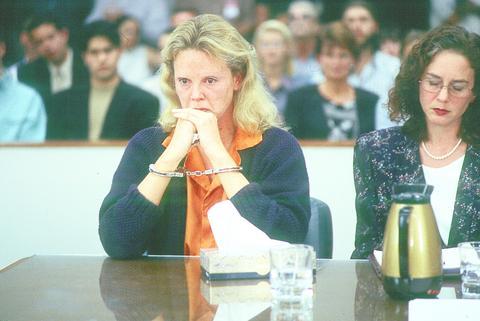The emotional intensity of her unforgettable performance recalls Hilary Swank's Oscar-winning turn in Boys Don't Cry, a bleak slice of American life that leaves the same bitter aftertaste as Monster.
With crooked yellowed teeth that jut from a mouth that spews profanity in a surly staccato, a freckled weather-beaten face and a prizefighter's swagger, Charlize Theron pulls off the year's most astounding screen makeover in Patty Jenkins's film Monster. At the very least the disappearance of the cool and creamy blond star into the body of a ruddy, bedraggled street person is an astounding cosmetic stunt.
But Theron's transformation, supervised by the makeup wizard Toni G, is not just a matter of surfaces. As Aileen Wuornos, the notorious Florida murderer whose career in homicide was sensationalized when the press inaccurately called her the first female serial killer, she uncovers the lost, love-starved child cowering under the killer's hard shell.

PHOTO COURTESY OF TAIONE NETWORK
Wuornos, who confessed to murdering six men in the late 1980s and early 1990s, died in the electric chair on Oct. 9, 2002, after spending more than a decade on death row. The movie, which focuses on her desperate, last-ditch relationship with Selby Wall (Christina Ricci), the lesbian lover who ended up testifying against her, is sporadically narrated by Wuornos.
Its fatalistic mood is set in an opening monologue in which she recalls a miserable childhood whose emptiness she filled with cheap fantasies of stardom and true love. Her naive faith in the existence of a rescuing Prince Charming led Wuornos to begin turning tricks at 13.
By the time the movie begins, Wuornos has plied her trade for years as a hitchhiking low-rent prostitute working the highways of central Florida. Her hopes have dried up. Down to her last five dollars and contemplating suicide, she drops into a saloon (that happens to be a lesbian bar) for one last drink, and meets Selby. After an edgy initial conversation Wuornos, who has never had sex with a woman, ends up spending the night with her.

PHOTO COURTESY OF TAIONE NETWORK
Because it is her first relationship in years to provide a semblance of affection, she grabs on to Selby and hangs on ferociously.
The film is so determined not to sentimentalize the affair that it is shown as a sad case study of dysfunction and desperate co-dependence. Its ultimate aridity parallels the impersonal semi-urban wasteland of central Florida with its strip malls, seedy bars and gas stations.
Selby, who has been shipped from Ohio to Florida by religious parents who can't deal with her sexuality, is an emotional basket case with a streak of timid rebellion. Once their affair is under way, Wuornos takes the reins and plays the role of a blustering, pseudomacho breadwinner and promises her sullen, needy partner the moon and stars.
Determined to give up prostitution and get a respectable job, Wuornos, pumped full of unrealistic expectations but lacking a
marketable skill, endures a series of humiliating job interviews that are made all the worse by her own grating refusal to accept rejection. The movie's most painful scenes illustrate the chasm between the smug workaday world and the demimonde of unsocialized outsiders who are clueless about the job market.
The movie's biggest disappointment is the vague, unfocused performance of Ricci, an actress known for taking risky, unsympathetic roles. Here she seems somewhat intimidated by her character. Although Jenkins' screenplay gives her the seeds to create a complex portrait, Ricci resists plumbing Selby's selfish, shallow exterior to discover her humanity.
The dramatic turning point arrives when Wuornos, driven back to prostitution, picks up a sadist (Vincent Corey) who ties her up and rapes her in an assault almost as horrifying as the rape scene in Boys Don't Cry. Freeing herself, she shoots him dead, buries his body and takes his money and car.
Something has permanently snapped inside Wuornos, and her once-suppressed fury at men is unleashed. The rest of her killings (not all are shown) could be seen as paranoid responses to the rape.
All are carried out to get money, which is quickly squandered on free-spending binges in motels and bars, and any sympathy you might have had for Wuornos after the rape begins to evaporate. One victim is a geeky, bumbling virgin; another a mild-mannered family man who tries in vain to reason with her.
What makes these encounters all the sadder is Wuornos' obvious horror and guilt at the pattern she has begun repeating.
Once she kills a policeman in civilian clothes, it's only a matter of time before she is identified and brought to justice.
Her final comment is a summary retort to all the comforting upbeat maxims like "Everything happens for a reason," and "Where there's life, there's hope," that help us fend off despair. After reeling off the list, she sneers, "They've gotta tell you something."

In the next few months tough decisions will need to be made by the Taiwan People’s Party (TPP) and their pan-blue allies in the Chinese Nationalist Party (KMT). It will reveal just how real their alliance is with actual power at stake. Party founder Ko Wen-je (柯文哲) faced these tough questions, which we explored in part one of this series, “Ko Wen-je, the KMT’s prickly ally,” (Aug. 16, page 12). Ko was open to cooperation, but on his terms. He openly fretted about being “swallowed up” by the KMT, and was keenly aware of the experience of the People’s First Party

Aug. 25 to Aug. 31 Although Mr. Lin (林) had been married to his Japanese wife for a decade, their union was never legally recognized — and even their daughter was officially deemed illegitimate. During the first half of Japanese rule in Taiwan, only marriages between Japanese men and Taiwanese women were valid, unless the Taiwanese husband formally joined a Japanese household. In 1920, Lin took his frustrations directly to the Ministry of Home Affairs: “Since Japan took possession of Taiwan, we have obeyed the government’s directives and committed ourselves to breaking old Qing-era customs. Yet ... our marriages remain unrecognized,

Not long into Mistress Dispeller, a quietly jaw-dropping new documentary from director Elizabeth Lo, the film’s eponymous character lays out her thesis for ridding marriages of troublesome extra lovers. “When someone becomes a mistress,” she says, “it’s because they feel they don’t deserve complete love. She’s the one who needs our help the most.” Wang Zhenxi, a mistress dispeller based in north-central China’s Henan province, is one of a growing number of self-styled professionals who earn a living by intervening in people’s marriages — to “dispel” them of intruders. “I was looking for a love story set in China,” says Lo,

During the Metal Ages, prior to the arrival of the Dutch and Chinese, a great shift took place in indigenous material culture. Glass and agate beads, introduced after 400BC, completely replaced Taiwanese nephrite (jade) as the ornamental materials of choice, anthropologist Liu Jiun-Yu (劉俊昱) of the University of Washington wrote in a 2023 article. He added of the island’s modern indigenous peoples: “They are the descendants of prehistoric Formosans but have no nephrite-using cultures.” Moderns squint at that dynamic era of trade and cultural change through the mutually supporting lenses of later settler-colonialism and imperial power, which treated the indigenous as